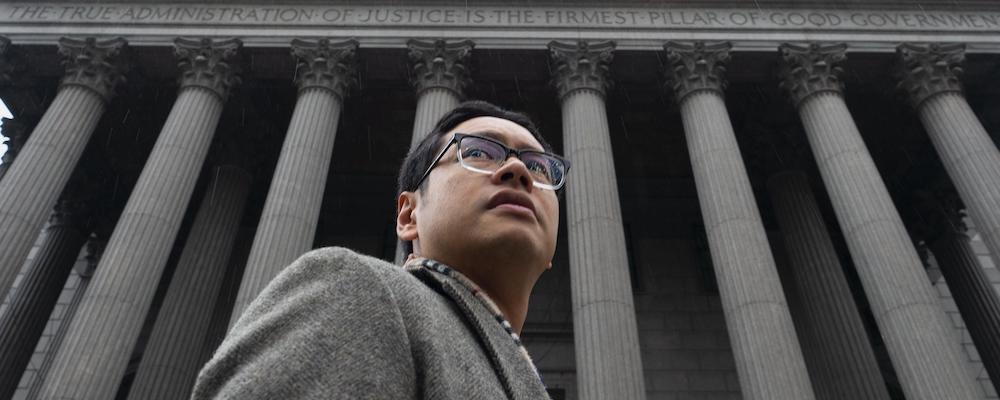‘The Fight’ Energetically Follows ACLU Lawyers as They Battle to Protect Civil Liberties
Alci Rengifo
For years the American Civil Liberties Union, known popularly as the ACLU, has been a lightning rod. Praise and vilification have been thrown its way in equal measure. The energetic documentary “The Fight” ventures into the ACLU’s offices as it challenges every controversial, discriminatory policy pushed by the current administration. While it obviously eschews liberal, general legal buffs might get a kick out of seeing its team of lawyers scramble, plan, debate and feel the stress of waiting for a decision.
The ACLU has offices dedicated to specific issues, so directors Eli B. Despres, Josh Kriegman and Elyse Steinberg focus on lawyers handling cases, which give us insight into just what these issues entail. Brigitte Amiri is given the case of an undocumented woman being denied an abortion by immigration authorities. Cis lawyer Joshua Block and trans lawyer Chase Stangio tackle Trump’s ban on transgender service in the army. Dale Ho challenges the White House’s attempts to put a question about legal status in the 2020 census. Lee Gelernt faces the wrenching task of representing families separated at the border. Their work poses the question of just how effective the courts are, even in a democracy, when facing the onslaught of the all-powerful state. Rarely do the filmmakers overly romanticize their subjects. We see them stress, nearly cry, or reveal their insecurities, as when Ho tries to rehearse in a hotel room what he will say before the Supreme Court. The pay is also not enormous, and we sense from even the interns that they do this work because they firmly believe in it. The camera is also given access to some of the clients, who are the true centers of this story. Adrift in a system they have little power in, those the ACLU represents would be anonymous victims, tossed by the winds of history.
Under any other administration “The Fight” might have worked as an intriguing, real life entertainment. On a superficial level it gives viewers a sense of what truly goes on beyond the fiction of courtroom movies. While the ACLU has been a well-known institution for many years, these lawyers still come across as underdogs. For every motion they file, the Trump White House comes back with a new tactic to impose its will. Block and Stangio, for example, face quite the uphill battle in challenging the ban on transgender service. They eventually manage to get a half-victory, with the White House agreeing to let current trans people in service remain in service, while blocking new enlistments. Amiri’s case with the undocumented woman migrant swerves from hope to despair. The documentary captures the strain of not knowing how a judge will decide on any given case.
It is such moments that also have a more universal appeal beyond politics. How legal battles unfold is one of the most intriguing aspects of “The Fight.” In one scene Ho is so nervous, he misreads a court decision by scanning it too rapidly the moment it arrives. Gelernt, one of the older, more experienced lawyers on the team, keeps a professional demeanor that threatens to crack when the scale of Trump’s family separation policies hits him in the gut. He also provides one of the documentary’s great recurring themes of comic relief. Gelernt has apparently not learned the value of carrying around a portable charger, finding himself constantly losing phone battery in the most crucial moments. You almost want to yell at the guy when he’s running around a coffee shop, desperately looking for an outlet as a key court decision is about to drop. A palpable sense of camaraderie also fills the documentary with a lively air. We see how messy a lawyers’ office can get, or the complicated task, in Block’s case, of trying to get work done with your kids running around the house. The lawyers are just as human as the clients.
Still, one cannot deny the political bent of “The Fight,” which propels the idea that the Trump White House is a threat to general civil liberties. The ACLU itself is not portrayed as explicitly only on the side of the left, emphasis is made on how it has also defended right-wing movements (like the American Nazi Party) to ensure everyone has a right to express an idea. Yet this administration in particular seems determined to curve American society back to a particular, conservative agenda. It is hard to argue that if there is no freedom for one side of the aisle, how can there possibly be freedom for the other?
“The Fight” breezes past with the pace of a high-tension legal thriller, but there is nothing to dismiss about its subject matter. It argues that a functioning democracy needs to have representation for everyone in the courts of law. As long as issues can be settled in the realm of serious debate, discussion and legal action, that more ominous shadow of violence can be avoided. That is something both sides should be able to agree on.
“The Fight” releases July 31 on VOD.

